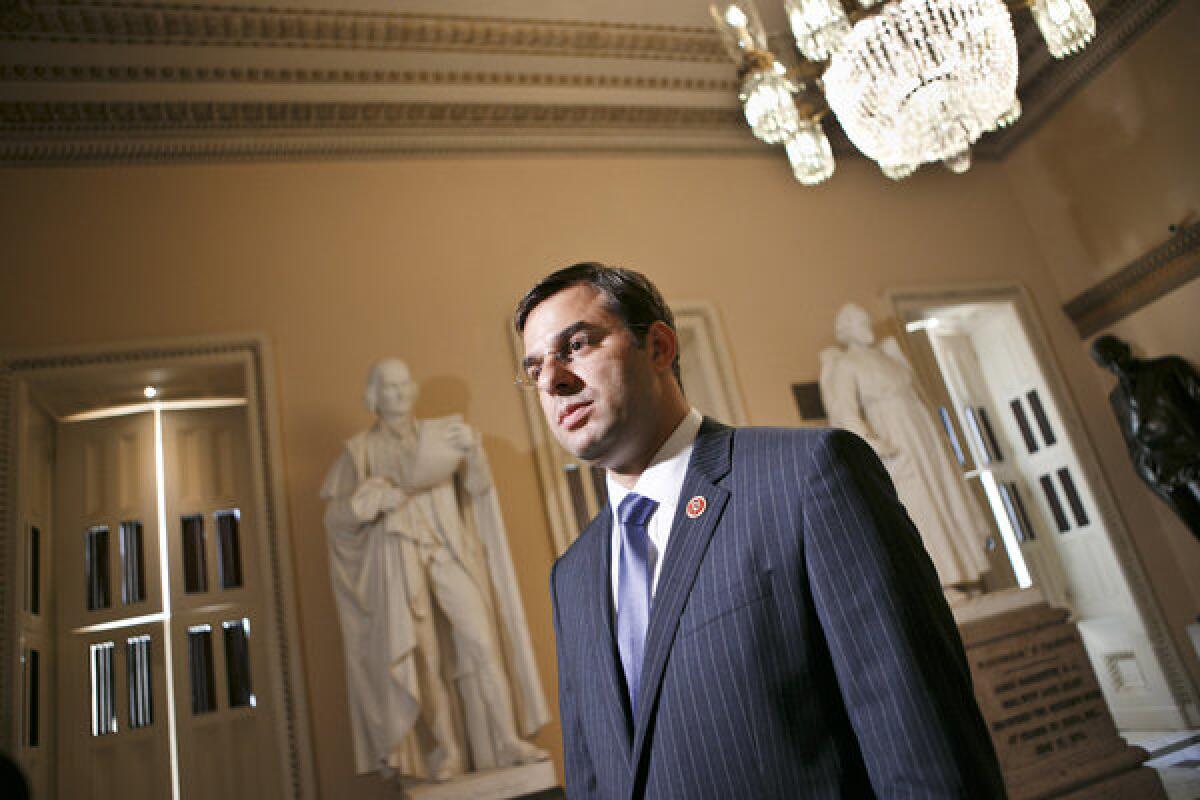The NSA surveillance driftnet can continue -- for now

An unusually bipartisan majority in the House of Representatives turned back a proposal Wednesday to stop the federal government from systematically gathering telecommunications metadata -- that is, a record for each phone line of the numbers dialed, incoming calls received and call duration.
That wasn’t surprising, given the objections voiced by top national security officials and President Obama himself. What was surprising is how close the vote was: 217 to 205, with a majority of Democrats in favor (111 out of 194 voting), along with more than 40% of the Republicans (94 out of 228 voting).
The amendment by Rep. Justin Amash (R-Mich.) would have barred federal agencies from obtaining orders from the Foreign Intelligence Surveillance Court to require businesses to disclose records about their customers’ activities unless those records pertained to a specific person under investigation for foreign intelligence activities. That restriction was designed to stop the National Security Agency from continuing to hoover up phone metadata.
Amash, who is aligned with the tea party, led the push for the amendment along with liberal Rep. John Conyers (D-Mich.).
Supporters of the government’s position -- including the House GOP leadership, which nonetheless reportedly helped Amash craft his amendment -- argue that the data gathering helps the government identify potential terrorist plots long before they can be carried out. But because our knowledge of the classified techniques are limited to the documents leaked by former NSA contractor Edward Snowden, we don’t know exactly why the government needs the information or how it’s analyzed. Instead, we’re left with vague notions of “big data” analytics that bring possible malefactors to the surface.
Similarly, opponents of the surveillance argued that it was an infringement on privacy and liberty, even though they couldn’t point to any specific harms.
There’s something creepy about the government collecting those records, to be sure. But if no human being actually looks at them, and the records don’t reveal by name who’s talking to whom or what they’re saying, where, exactly, is the damage to personal privacy?
I say this as someone who thinks the NSA’s data collection is wrong and should be stopped. That’s because it pushes us too far down the road toward a surveillance state, where every movement, utterance and transaction is tracked in the name of public safety.
There’s a continuum of trade-offs between liberty and security, and it’s hard to tell exactly where those competing interests should be balanced. We very much want to have both, after all, and it’s much easier to see in retrospect than in real time when one of the two gets too much emphasis and the other too little. Often we rely on our gut and our imagination to inform us; in this case, mine’s telling me that it’s more dangerous to let the government systematically collect records of every American’s phone use than it is to confine its research to actual suspects.
At any rate, the fight is likely to continue in the Senate, although there’s probably fewer tea party Republicans and civil-libertarian Democrats there willing to challenge the administration.
Glenn Greenwald, one of the journalists who broke the story about the government’s ongoing surveillance, tied the action on the House floor back to Snowden, who’s likely to face espionage charges if the government can find a way to extract him from Russia. “Edward Snowden did what he did to make everyone aware of all this, and to prompt precisely this debate. This was his motive,” Greenwald wrote on Twitter.
Snowden certainly has his fans, Greenwald among them. But even his detractors should admit that lawmakers need to be debating these issues -- and preferably debating them with more information than rank-and-file House members had Wednesday -- because the give-and-take calibrates just how much liberty we’re willing to trade off in the name of fighting terrorism.
ALSO:
Rhetoric, race and reality in America
Anthony Weiner’s dance with the sexting devil
Follow Jon Healey on Twitter @jcahealey
More to Read
A cure for the common opinion
Get thought-provoking perspectives with our weekly newsletter.
You may occasionally receive promotional content from the Los Angeles Times.







